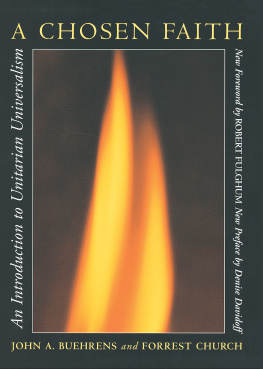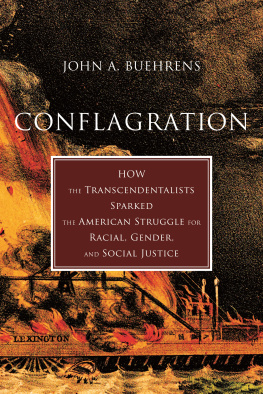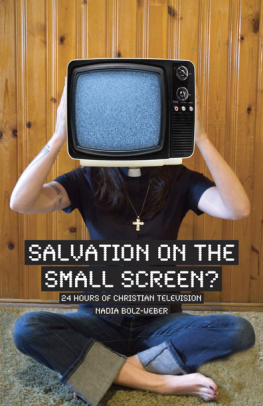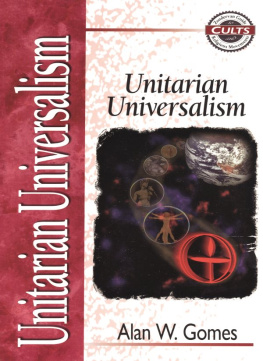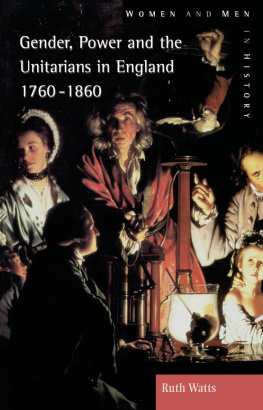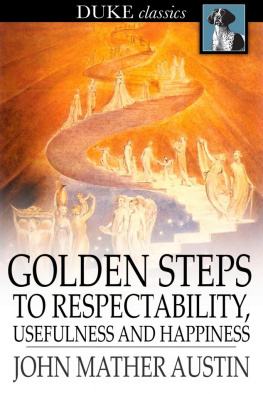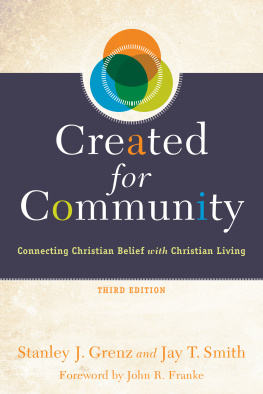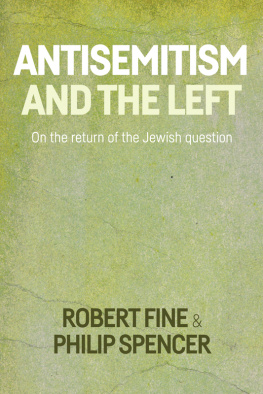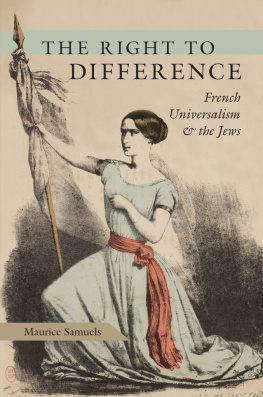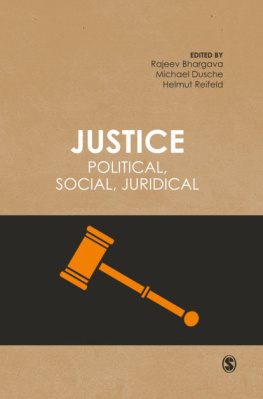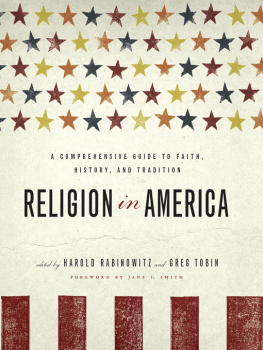A Chosen Faith
A
CHOSEN
FAITH
An Introduction to
Unitarian Universalism
Revised Edition
John A. Buehrens and
Forrest Church
New Foreword by Robert Fulghum
New Preface by Denise Davidoff
BEACON PRESS BOSTON
Beacon Press
25 Beacon Street
Boston, Massachusetts 02108-2892
www.beacon.org
Beacon Press books
are published under the auspices of
the Unitarian Universalist Association of
Congregations.
1989, 1998 by Beacon Press
All rights reserved
Printed in the United States of America
11 10 09 08 16 15 14 13
This book is printed on acid-free paper that meets the uncoated paper
ANSI/NISO specifications for permanence as revised in 1992.
Text design by Lisa Diercks
Library of Congress Cataloging-in-Publication Data
Buehrens, John A.
A chosen faith : an introduction to Unitarian
Universalism /
John A. Buehrens and Forrest Church ; new foreward
by Robert Fulghum ; new preface by Denise Davidoff.
Rev. ed.
p. cm.
Rev. ed. of: Our chosen faith. 1989
Includes bibliographical references (p. ).
ISBN 978-08070-1617-6
I. Unitarian Universalist churches-Doctrines. I.
Church, F. Forrester.
II. Buehrens, John A., 1947 Our chosen faith.
III. Title.
BX9841.2.B84 1998
230.9132-dc21 97-51479
To Gwen Langdoc Buehrens, Amy Furth,
and George Hunston Williams
Contents
/ Robert Fulghum
/ Denise Taft Davidoff
H ERES PART OF a conversation in a bookstore:
Mr. Fulghum, is it true that youre a minister?
Yes.
Wheres your church?
Were standing in it.
But this is a bookstore and its a Friday.
Yes, but you might also choose to see it as a cathedral of the human spirita storehouse consecrated to the full spectrum of human experience. Just about every idea weve ever had is in here somewhere. A place containing great thinking is a sacred space.
Really? Just what kind of minister are you?
Unitarian Universalist.
And you hold services in bookstores on Fridays? Youre putting me on.
No, but I am giving you an example of how Unitarian Universalists think. More than anything else, our religion is defined by an attitude. An open-minded point of view. About everything and anything. What we have most in common is an uncommon way of looking at the obvious. A church is not just a specific building, but also a way of looking at the building youre in at the moment. A minister is not just a person who stands in a pulpit and preaches on Sunday mornings, but also the way some people engage the world. A religion is not contained in a single book; theres something religious in almost any book.
OK, but Ive seen a building in my neighborhood with a sign that says Unitarian Universalist Church on it and there are a lot of cars parked around it on Sunday mornings. Looks like a regular church to me.
Of course. We come together in community and do many things any religious community doesand Sunday mornings are a culturally convenient time to meet. But we also come together during the rest of the week.
To do what?
To share ideas, discuss political action, work on projects of benefit to the larger community in which we live, and hear speakers on a broad range of topics. We enjoy and need the companionship of like-minded people.
Mr. Fulghum, Ive read all your books. Is what you write a sample of what Unitarian Universalists believe?
Yes and no. I would expect, and hope, that most Unitarian Universalists would not agree with everything I think and write.
You mean theres no party lineno dogma?
Yes and no. We agree that individuals must work out their own religious conclusions. We agree that we will disagree on those conclusions. We agree to respect those differences. We agree to learn from one another through dialogue about our beliefs. We agree on a process and the tools to be used in the process.
Give me some examples of the tools.
The principles of democracy, integrity, continuing education, and individual responsibility, to name a few.
It sounds more like NPR or PBS to me than a church.
Actually, the analogy is not far off. Public radio and public television are good examples of things that Unitarian Universalists support. We want to be exposed to a wide range of information and a broad range of viewpoints. We want each individual to have an influence on programming, and we want each individual to take responsibility for keeping the programs on the air. Its not the easiest way to go about radio or religious community, but its the way we choose.
So if Im open-minded and listen to NPR and watch PBS, I qualify as a Unitarian Universalist?
Lets say you have Unitarian Universalist tendencies. There are, however, Unitarian Universalists who listen only to jazz or country-western music or opera, or those who watch only baseball on TV. I say again, we respect diversity in all things.
What about politics?
No exception. Full spectrum. Democrats, Republicans, Libertarians, Socialists, and a few who are either Anarchists or just confusedits hard to tell. We share only the conviction that one ought to be active in the affairs of the world. We dont dictate which particular party one ought to join.
Are Unitarian Universalists Christians?
Again, yes and no. Some are and some arent, and some havent decided. Same answer if you ask whether Unitarian Universalists are Buddhists. In fact, most of the specific questions you might ask have this kind of answer. Yes and no. Some are and some arent. Some do and some dont. Were known for respecting diversity of opinion and belief.
Id like to come take a look at a church like that, but I dont want to get put on your missionary list.
No problem. We dont evangelize. We keep a door open to those who are looking for the company of people like us. We find there are a great many people who are Unitarian Universalists and dont know it. When we ask most Unitarian Universalists how they came to be members, they say its because they were looking for a community of people who are liberal in their religious values and active in their commitment to community service. We believe in the right of the individual to choose religious principles and in the individuals responsibility to put those principles into practice.
Id like to know more.
What youve just read is a reconstruction of an awkward conversation Ive had many times. Its hard to summarize ones beliefs in a few momentstheyre products of a lifetimes experience. Hard, also, to give a short historical perspective of Unitarian Universalism because it too is long and rich and deep. If you want to have better answers to your questions about our chosen faith, read further in this book. If you really want to know what it means to be a Unitarian Universalist, come see what we are and what we doyou may be one of us.
Robert Fulghum
M Y HUSBAND , J ERRY , and I discovered the Unitarian Universalist church in Westport, Connecticut, in the winter of 1960. We liked the people. We liked the Sunday morning worship in the Saugatuck School auditorium. We liked the potluck suppers. We loved the minister, Arnold Westwood. Even three-year-old Douglass liked the place. It seemed like a perfect fit.
Sounds easy, you say. But it wasnt. Signing the membership book in a Unitarian church was scary beyond belief for me even to contemplate. How would I tell my parents I was rejecting the faith of my forefathers? (Yes, fore fathers ! Remember, this was 1960.) I dont just mean my Jewish grandfathers Louis Taft and Harry Zuckerman, who had emigrated from the Ukraine in the late nineteenth century. I mean those other forefathers: Abraham, Isaac, and Jacob. How would I tell my aunts and uncles and cousins? How would I tell my in-laws? How would I tell our friends, particularly those in the Temple Israel community in our town?
Next page
